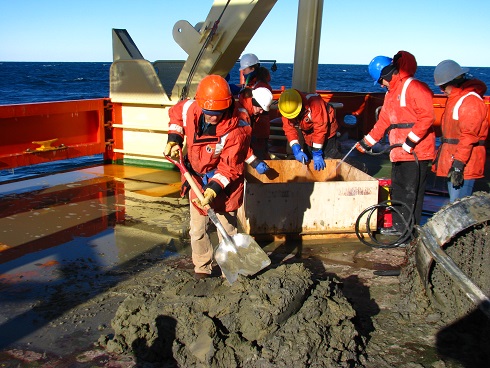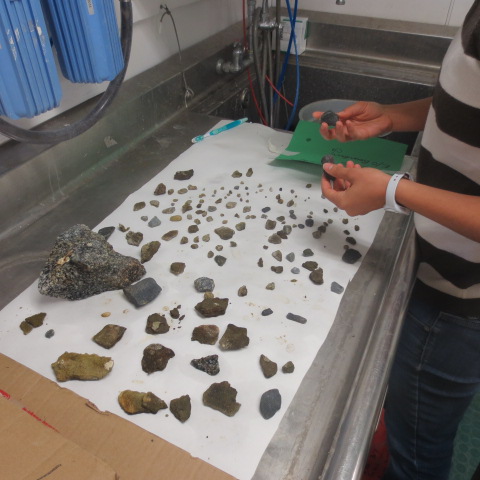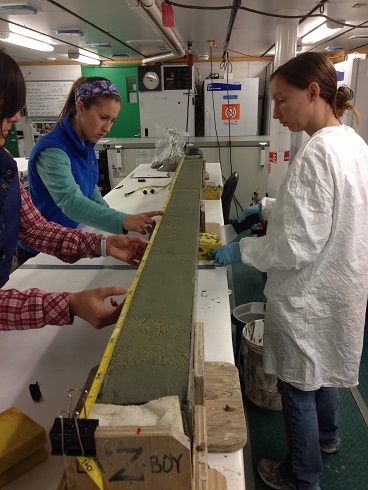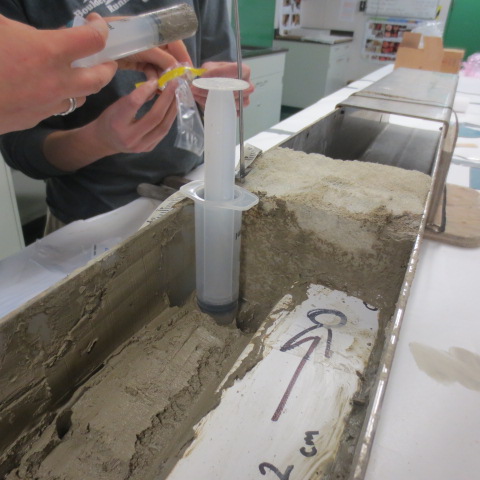We are now in our 31^st day at sea. We spent 7 days transiting the southern ocean from Hobart Tasmania to the East Antarctic coast. During that time we crossed the latitudes dubbed the ferrous 50's and the screaming 60's. Since we arrived at the continent we have been working our way ice and open water, mainly ice. Today we are experiencing a good old fashioned blizzard, making the visibility near zero. If I was back at school it would be a snow day.
Sampling, processing and documentation of samples
 a geologic dredge being worked on , on the back deck
a geologic dredge being worked on , on the back deck
Since we will probably be riding it out as we transit through the sea ice let's talk about an important side of scientific research.The painstaking, methodical process researchers and their students must do to assure accurate results.
 One of hundreds of samples to be cleaned, categorized , documented and packaged.
One of hundreds of samples to be cleaned, categorized , documented and packaged.
It has been many years since my days as a graduate student. Ok many years. I had a graduate assistant job with Dr. Osterberg of SUNY Potsdam (NY) cataloguing all the species I observed on Barnhardt Island on the St. Lawrence River. It reminds me a little bit of what is happening on our cruise with a few exceptions. We are in an area that has never been studied. The samples and data will be used by scientists throughout the world. There is NO room for error.
The expedition has completed hundreds of deployments dealing with, physical oceanography, geology and biology. There are dozens of high tech machines that are used for gathering the samples. Once the samples are on deck or in the lab, the meticulous process of testing samples begins.
 The students preparing a Kasten core sediment sample for testing
The students preparing a Kasten core sediment sample for testing
There can be dozens of individual tests that need to be performed for each deployment. And for each test there could be hundreds even thousands of individual samples that are collected. Everything is done in a specific way so as to avoid any contamination or compromising of the samples. This scientific process assures that the data is 100% accurate. Science is based in facts and facts are the result of good data. In any good experiment there must be a large volume of sampling.
 Thousands of tests and samples are worked on almost daily in the various labs on board.
Thousands of tests and samples are worked on almost daily in the various labs on board.
It is imperative that the PI (Principal Investigator) in charge communicates clearly and helps whenever possible. To be honest this part of the cruise is not very exciting and can be tedious and exhausting. That along with the fact that we are in such a remote environment makes it that much more difficult. But to quote one of our PI's "If it was easy than everybody would be doing it". Doing this type of for work long hours, over and over again is nothing new. It is all part of the requirements to become a scientist. I am lucky to be working with a group of incredible students. I am sure that all of them will have a bright future. I just wish they would appreciate the music of my generation! Crazy kids.....

